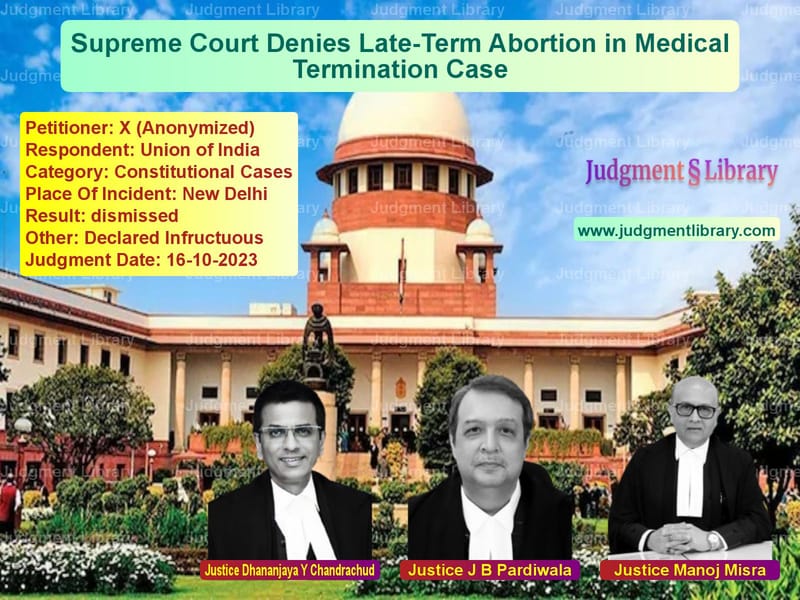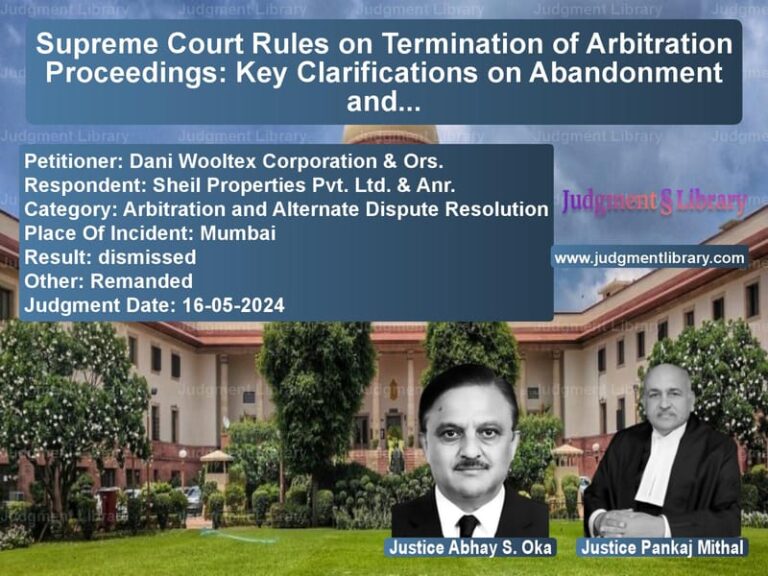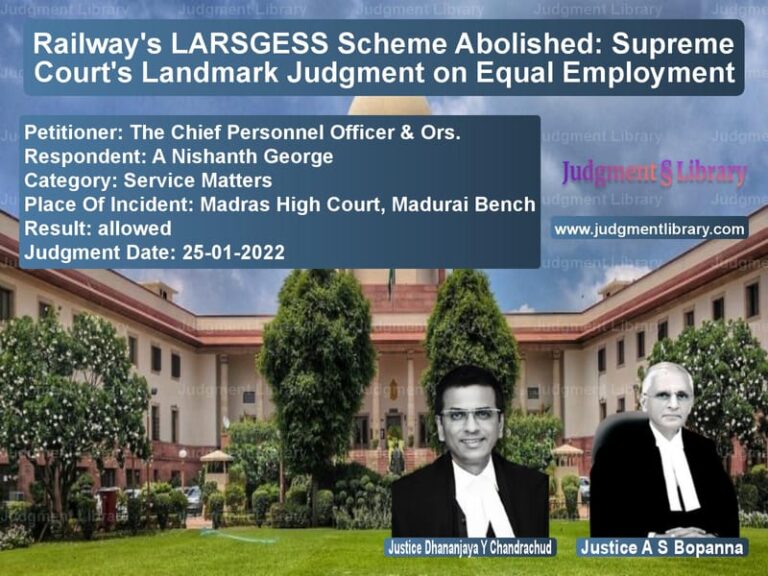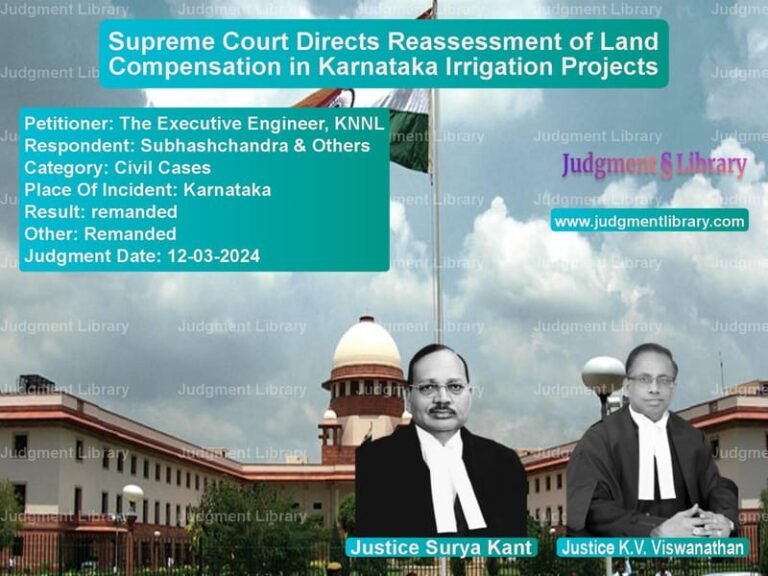Supreme Court Denies Late-Term Abortion in Medical Termination Case
The Supreme Court of India recently ruled in the case of X vs. Union of India, dealing with the contentious issue of medical termination of pregnancy beyond the statutory limit. The judgment involved a 27-year-old married woman who sought permission to terminate her 26-week pregnancy due to postpartum depression and financial hardship. The ruling clarifies legal and ethical considerations in late-term abortion cases and the application of the Medical Termination of Pregnancy (MTP) Act, 1971.
Background of the Case
The petitioner, a married woman with two children, approached the Supreme Court seeking permission to terminate her 26-week pregnancy. She claimed that she was unaware of the pregnancy due to lactational amenorrhea and only discovered it during a medical check-up.
She sought abortion citing:
- Severe postpartum depression, which she feared would worsen if the pregnancy continued.
- Financial constraints, as her husband was the sole earning member of the family.
Since the pregnancy had crossed the 24-week statutory limit, the petitioner required special approval from the Supreme Court.
Initial Supreme Court Order
On October 9, 2023, a two-judge bench comprising Justices Hima Kohli and B V Nagarathna permitted the abortion, stating:
“Continuing with the pregnancy could seriously imperil the mental health of the petitioner.”
The Court directed the petitioner to undergo the procedure at AIIMS, New Delhi.
Medical Board’s Objection
Before the abortion could take place, a doctor from AIIMS sent an urgent email to the Additional Solicitor General (ASG), raising concerns:
- The fetus was viable (weighing 886 grams) and had a reasonable chance of survival.
- If abortion proceeded without fetal demise (feticide), the baby would likely require intensive care.
- The child could suffer from long-term disabilities due to preterm birth.
- AIIMS sought Supreme Court guidance on whether to stop the fetal heartbeat before proceeding.
Split Verdict on Review Petition
On October 11, 2023, the Supreme Court reviewed the case after receiving the AIIMS email. The two-judge bench delivered a split verdict:
- Justice Hima Kohli: Opposed the abortion, stating that allowing it would be unethical given the fetus’s viability.
- Justice B V Nagarathna: Supported the petitioner’s autonomy, ruling that a woman’s decision should take precedence over fetal rights.
Due to the disagreement, the case was referred to a three-judge bench headed by Chief Justice D Y Chandrachud.
Supreme Court’s Final Judgment
On October 16, 2023, the Supreme Court ruled against the abortion request, citing multiple legal and medical concerns:
1. Pregnancy Exceeded the Legal Limit
The Court emphasized that termination beyond 24 weeks is only permitted under the MTP Act in cases of:
- Severe fetal abnormalities
- Immediate risk to the mother’s life
Since neither condition was met, the Court ruled:
“The petitioner’s case does not fall within the exceptions provided under the law.”
2. Fetal Viability and Ethical Considerations
The Court acknowledged AIIMS’s report that the fetus had a strong chance of survival. The judgment noted:
“In the absence of a directive to stop the heartbeat, the viable fetus would be faced with a significant risk of lifelong physical and mental disabilities.”
Since fetal demise (feticide) is only performed in cases of severe abnormalities, the Court ruled against it.
3. Maternal Health Concerns
The petitioner argued that continuing the pregnancy would exacerbate her postpartum depression. However, the AIIMS Medical Board found:
- She had a history of postpartum psychosis but was stable on medication.
- Her condition could be managed without terminating the pregnancy.
Based on these findings, the Court held:
“Medical reports indicate that the petitioner’s condition can be treated without necessitating termination of pregnancy.”
Final Court Directives
The Supreme Court issued the following directives:
- Abortion was denied.
- The petitioner was required to carry the pregnancy to term.
- AIIMS was directed to oversee the safe delivery and provide psychiatric care.
- If the petitioner did not wish to raise the child, the government would facilitate adoption procedures.
- The Union government agreed to cover the medical costs for delivery and postpartum care.
Implications of the Judgment
The ruling sets important legal and ethical precedents:
1. Reinforces Legal Limits on Abortion
This case reaffirms that termination beyond 24 weeks is allowed only under strictly defined exceptions in the MTP Act.
2. Balancing Women’s Autonomy and Fetal Rights
While acknowledging the woman’s mental health concerns, the Court ruled that the rights of a viable fetus cannot be ignored.
3. Ethical Challenges in Late-Term Abortions
The judgment highlights ethical complexities, particularly regarding feticide in viable pregnancies.
Conclusion
The Supreme Court’s ruling in X vs. Union of India is a landmark judgment clarifying India’s late-term abortion laws. While the Court recognized the petitioner’s personal hardships, it prioritized fetal viability and the legal framework of the MTP Act. The case underscores the delicate balance between a woman’s reproductive autonomy and the rights of an unborn child.
Read also: https://judgmentlibrary.com/supreme-court-upholds-senior-advocate-designation-under-advocates-act/
Petitioner Name: X (Anonymized).Respondent Name: Union of India.Judgment By: Justice Dhananjaya Y Chandrachud, Justice J B Pardiwala, Justice Manoj Misra.Place Of Incident: New Delhi.Judgment Date: 16-10-2023.
Don’t miss out on the full details! Download the complete judgment in PDF format below and gain valuable insights instantly!
Download Judgment: x-(anonymized)-vs-union-of-india-supreme-court-of-india-judgment-dated-16-10-2023.pdf
Directly Download Judgment: Directly download this Judgment
See all petitions in Fundamental Rights
See all petitions in Public Interest Litigation
See all petitions in Judgment by Dhananjaya Y Chandrachud
See all petitions in Judgment by J.B. Pardiwala
See all petitions in Judgment by Manoj Misra
See all petitions in dismissed
See all petitions in Declared Infructuous
See all petitions in supreme court of India judgments October 2023
See all petitions in 2023 judgments
See all posts in Constitutional Cases Category
See all allowed petitions in Constitutional Cases Category
See all Dismissed petitions in Constitutional Cases Category
See all partially allowed petitions in Constitutional Cases Category







